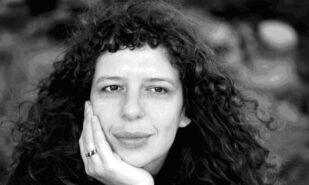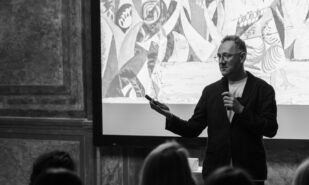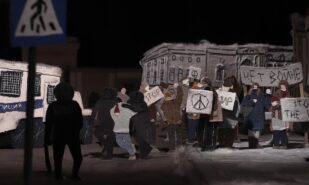Beloved contemporary children’s poet and author Masha Rupasova hardly needs an introduction. It seems there’s hardly a Russian-speaking child today who doesn’t recognize the line: “What were you doing, Grandma, in the days of your youth?” Rupasova spoke to us about the painful search for meaning in a frightening new world. The conversation turned out to be sobering, yet surprisingly uplifting.
Masha Rupasova: “There Was Hope During COVID”
How are things with your empathy? Toward yourself, others, the world?
A friend of mine, a Canadian-Israeli, told me about a book by professor Gad Saad on “suicidal empathy.” Maybe we all need to read it. Because this feeling that you’re responsible for absolutely everything happening, this nonstop 24/7 empathy over the course of years — it really does something unhealthy to your mind. It certainly did to mine. So right now, I’m once again trying to read fewer news stories — not to stay ignorant, but so that the news doesn’t become the entirety of my life. Every time I get to the point of needing to see a doctor, I also arrive at the thought: maybe I should take care of myself a little, too.
Did this begin with COVID or the war?
I think the war. During COVID there was still hope — that things would soon get better. Now, we already know that even if it ends, it won’t get better anytime soon. We’ve learned too many heavy truths about the world.
Can we try to piece this world back together? I’m asking you specifically because I know for a fact that your books help do that.
I’ve heard that — people have told me to my face. A year ago, Nastya Izyumskaya invited me to the “Man in Search of Meaning” conference. Honestly, I felt lost then, because I myself was searching for meaning. I couldn’t work, my health had collapsed to the point that I admitted myself into a clinic. The only thing I could do was read aloud some passages from my new book The Wonderful Transformations of Marya Petrovna Utkina. Afterward, listeners wrote to me saying it felt like they’d visited an old world, where things were still okay.
I don’t really know what we can do with our books, pictures, toys — with our small, fragile hands. It’s good that we have children, because for their sake, we’re at least obligated to maintain the appearance of life. Whether we want to or not, there has to be food three times a day, a bedtime story. Clinging to that routine helps us hold on. I see how women — especially women! — manage to maintain the illusion of life. Maybe that illusion is life.
Women come up with micro-projects, they knit, they sew. A good friend of mine in Germany started a project with Ukrainian refugees: they sew bags out of high-quality biodegradable Belgian linen. It’s a complex, beautiful, and expensive concept. Everything is falling apart, and these women are weaving thin threads between countries — the bags travel to the U.S., Canada, Europe. Women are patching up the destruction, planting things in the ruins…
I probably can’t say anything useful or inspiring here. I want to say: keep doing what you can, come what may. But for example, I haven’t been able to write for four or five months — breaking contracts.
I understand the war is the root of it, but can you describe what exactly has changed in you?
I’ve thought a lot about that over the last three years. You know, I used to produce three to five books a year, plus a couple of plays. Now, at best, one or two books come out. There are a few reasons. First, I stopped feeling joy. And a children’s author can only write from a place of happiness. You can write sad books, but the base emotion still has to be joy. I have little moments of joy — just enough for daily life, but not for books.
Second — my image of the future fell apart. I used to write while envisioning the future. These children would grow up in 20 years, and I hoped they’d live in a world I dreamed of for them — with open borders, mutual respect, and appreciation for differences.
We’ve lost joy, but haven’t we also changed how we perceive sorrow? Has the scale shifted?
Oh yes, the scale changed so much that for the first couple years, I didn’t react to my own life at all — and that’s not healthy. I’ve even thought about creating a private community for people who feel ashamed to complain. We’ve lost so much too. People often accuse me of saying things from safe Canada, but even here I’ve experienced losses from this war. I can’t go back to Russia. I haven’t seen my mother in five years, and she’s aging. I was too afraid to travel to my stepfather’s funeral last year. I left loved ones without support.
On one hand, you don’t complain publicly — others have it worse, at least I’m not being bombed. But in the scope of my small personal life, these are enormous losses.
Sooner or later, the number of denunciations against me will cross a threshold, and my books and I will be banned in Russia. I’m not labeled a foreign agent yet — but once I am, my books will disappear from the market. Oh dear, this is turning into quite the un-cheerful interview…
There haven’t been many cheerful ones in years, so we’re on trend.
For the last three years, I’ve lived in constant fear. The first year was especially hard — I just sat and howled. And people come to interview you secretly hoping that a children’s writer has found the answer. I was listening to Katya Shulman on YouTube, and she said: “We’re bombarded with information and powerless to change anything, and people with consciences feel responsible for everything.” Then she added, “And I don’t know what to do with that.” I thought, well damn — if even Shulman doesn’t know, what hope do I have?
Did you have many personal breakups or disappointments after the war started?
Surprisingly, no. Anyone who wasn’t solid probably fell away back in the Crimea days. I lost some readers, and that hurt a lot. I guess I also disappointed some of them. I openly supported Ukraine, gave interviews saying Russia was wrong. Some readers — maybe ten or so — took the trouble to write and tell me how disappointed they were. They even sent photos of my books in the trash. That hurt. I thought — guys, you know me as someone who cared about our shared future. I’m not a fascist or a killer. But that’s precisely what disappointed them. That was a real loss.
And toward the end of the first year, the denunciations began. Reports to bookstore management, claiming Rupasova supports fascism, LGBT, childfree values, carries flags — which I rarely do, by the way. The denunciations weren’t just offensive — they were painful.
How do you deal with that? What helped you get through?
Nothing helped. I just stewed in it. You can’t forget it when you see the denunciation with your own eyes. What struck me most was the lifeless, bureaucratic TV-language of the reports. Half-trash, half-official — the kind meant to appeal to some official who speaks that same dead language. And there’s nothing you can do. Just accept and keep going.
Have you thought about parallels between current emigration and pre- or post-revolutionary waves?
Yes. There’s definitely something in common. The losers are forced to leave. I think we’re a wave of the defeated, unfortunately. Maybe we had a chance — if Russia lost the war. But I don’t think that’s going to happen. The world won’t let Russia lose. So things will only get worse. There’ll be nowhere for us to return to. It looks like this will go on for twenty more years. And in twenty years, our children won’t go back — their home will be elsewhere.
Have you grieved not being able to go back to Russia?
Oh yes. That grief has become part of me, part of my structure. I have a good memory — I can recall every cherished place, and I “travel” there in my mind often. Maybe the repetition dulls the pain. I grieve more for what didn’t happen — the future we lost. The Russia we could’ve had. The children now being bombarded by propaganda. The future that awaits them. That’s what brings me pain.
Turns out we were lucky — we lived through Perestroika, we had hope, we had the early 2000s, when we naively thought things were heading toward something better, something humane. But now — I don’t know what young people and kids are supposed to do.
So we lived the prime of our conscious lives in hopes that didn’t come true?
Yes. And now I understand how my parents’ generation felt. They had their hopes, a stable life — then everything collapsed when the USSR fell, when Perestroika began, and everything went “market.” When people started criticizing the USSR, they felt like it wasn’t just the state being devalued — it was their lives. Now they support this whole greatness narrative to reclaim that worth, both for themselves and for the country. In their minds, they are the USSR. I get it now.
That’s the mechanism of ressentiment, basically.
Which we’ve now lived through ourselves. All the books we wrote, projects we started, the charity work — it feels like it was all for nothing.
It’s a chilling thought — but hasn’t every generation gone through something like this? Like it or not, you start believing in karma.
Yes, I think so too. Maybe this place is some kind of anomaly — a tectonic fault. I’m an atheist, so I don’t have any explanations. Just psychological ones, I guess.
Have you always been an atheist?
Probably. My grandmother tried to raise me in the church — she was a Seventh-Day Adventist. But she never really got me interested. Intellectually, I understand faith. But emotionally — it’s empty for me.
Let me ask something unrelated to the world — but directly related to you. How do you write? Do you dance it out? Walk it out? Or just sit down and go?
Vera Polozkova described it well — like making cotton candy. Inside, something starts spinning — not images or ideas, just an emotional imprint. I never have a plan or idea, but I get a very clear feeling, and the text has to match it. Once that feeling arrives, the book is inevitable.
Just yesterday, I told my husband I couldn’t catch that emotional imprint for the new book. I’ve started three times and scrapped them all. Last time, it came out of nowhere — one October morning I sat on the balcony with coffee, and boom. I wrote the whole book that month. It’s already out — under a pseudonym, because I don’t want to be declared a foreign agent yet.
That feeling always leads the way, whether it’s a poem or prose. A strong emotion starts swirling — and you pull out a poem or a book. I miss that feeling terribly. I need it. I’m under contract. Some publishers have already paid me. And inside me — silence. Total silence.
And you can’t lure that feeling out?
I’ve tried, of course. Maybe stop eating sugar? More cardio? Walk more? Sleep more? Drink coffee? I’ve tried to hack it — but it doesn’t hack. Now I’ve cut out all cheap dopamine: no social media, no reels. I’m rereading old books — Ilf and Petrov right now. Still not working.
I even thought about going on a retreat — but I’m afraid I’ll spend all that money and come back with nothing. I don’t know what to do.
You probably know that concrete void — when you look inside and ask, “Okay, what do you want? Let’s talk.” And there’s not even silence in response — there’s no one there. For religious people, I think that’s what they call godlessness. It’s the same with creativity — at least for me.
And with illustrators — does there also need to be a shared feeling?
These days, I lose interest in the text pretty quickly — it starts living its own life. With the early books, I wanted to protect them, to have the illustrations match my vision. But artists are individuals — they do their thing. In the end, the illustrator becomes a co-author. The text is like a child — it has its own relationships: with the artist, the publisher, the editor, each reader. You can only influence it as much as you can a child.
Since we’re talking about children. Your son is growing up. Is it hard to start loosening the reins?
Sometimes I think — what luck that I’m already so ready for an empty nest, I even count the years until he leaves for college. Then he throws away the last of his toys — and I feel sad. I see this chapter of our life ending. My little boy will only live on in my memory. His babyhood and childhood matter now only to me and his dad. And when he wants that part of himself again — thirty years will have passed.
But then I see him act sensibly, and I’m happy again — another piece of responsibility lifted from me. I grieve, I rejoice. I suppose that’s how it should be.





